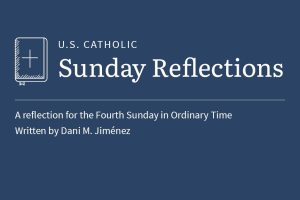Readings (Year C):
Proverbs 8:22 – 31
Psalm 8:4 – 5, 6 – 7, 8 – 9
Romans 5:1 – 5
John 16:12 – 15
Reflection: The hope that does not disappoint
Once while travelling in Montana, my children and I found some rocks that the locals call “wishing stones.” Legend says that tracing with a finger the rock’s single white stripe of calcite, while at the same time thinking of a hope, guarantees the dream will come true.
We might wish for rain to nourish a garden or hope our team wins the game or hope a loved one will be healed. But an old adage tells us to be careful about what we wish for—because our limited human capacities cannot always imagine or discern what is best for us and for others. Very often, what we hope for is comfort, and what will make our lives easiest. And when those types of hopes are fulfilled, we might feel satisfied, but only temporarily. Soon we find ourselves hoping for something new.
On this solemnity we reflect on a much deeper mystery than wishing stones and mundane hopes, one central to the Christian faith: the most holy Trinity. All three readings attempt to explain aspects of this complicated belief. For me, the second reading encapsulates all we need to know about the triune God because it explains the theological virtue of hope, a hope that cannot be acquired by human effort.
The goal of virtually every letter from St. Paul to the early Christians, now addressed to us, is to fortify faith. The former Saul, who was transformed by meeting a member of the Trinity along the road to Damascus, understands in a special way the difference between human hope and the virtue that is infused in us only through baptism and the sacraments.
In chapter eight, Paul tells the Romans that “Hope that sees for itself is not hope.” He explains how hope seen through the Trinity offers greater rewards than satisfaction. To Paul, hope is a person, the Resurrected Christ. He tells us that if we define hope through the Son’s works of love and mercy by continuing that work ourselves, we’ll experience peace beyond ordinary understanding. We will recognize that peace as divine companionship, when we accept a gift offered by another member of the Trinity, the Father.
That gift is grace. And only grace can elevate our senses beyond what we see, beyond what we wish for, beyond worry and desperation, and toward concrete awareness of the third manifestation of the triune God, the Holy Spirit. Grace gives us courage to seek the Spirit’s help in strengthening our virtue of hope.
So while wishing stones might be entertaining to find and treasure, the only hope that never disappoints is fortified by the Trinity: the hope that God’s perfect and abundant love will be “poured into our hearts.”














Add comment